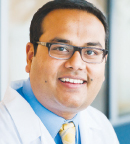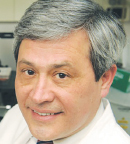A large comprehensive patient-level meta-analysis showed that achieving pathologic complete response after neoadjuvant chemotherapy correlates with significantly improved event-free survival and overall survival in patients with localized breast cancer. These findings were particularly robust in triple-negative breast cancer and HER2-positive breast cancer. Event-free and overall survival were similar regardless of whether patients received additional adjuvant chemotherapy. The findings suggest that adjuvant chemotherapy can be abbreviated or even omitted in some patients if they achieve pathologic complete response to neoadjuvant chemotherapy.

Similar outcomes with or without adjuvant chemotherapy in patients who attain pathologic complete response on neoadjuvant chemotherapy … support the clinical utility of escalation and de-escalation strategies in the adjuvant setting base on neoadjuvant response.— Laura M. Spring, MD
Tweet this quote
“Similar outcomes with or without adjuvant chemotherapy in patients who attain pathologic complete response on neoadjuvant chemotherapy likely reflects tumor biology and support the clinical utility of escalation and de-escalation strategies in the adjuvant setting based on neoadjuvant response,” said lead author Laura M. Spring, MD, a medical oncologist at Massachusetts General Hospital Cancer Center, Boston. Dr. Spring presented these results at the 2018 San Antonio Breast Cancer Symposium,1 and they were in keeping with several other presentations suggesting that de-escalation of treatment of breast cancer may be possible.
“Breast cancer trials have traditionally added additional systemic therapies to reduce recurrence risk, but this adds to toxicity and may represent overtreatment for some patients. Neoadjuvant chemotherapy offers several additional advantages over adjuvant therapy, including rapid assessment of response using surrogate markers like pathologic complete response,” she told listeners.
Objectives and Implications
The study Dr. Spring presented examined the impact of subsequent adjuvant therapy following pathologic complete response in the neoadjuvant setting and long-term outcomes. She and her co-researchers also examined the relationship between the magnitude of change in pathologic complete response and corresponding changes in event-free survival.

The study findings highlight the potential importance of pathologic complete response (or lack thereof) in clinical decision-making.— Aditya Bardia, MD, MPH
Tweet this quote
Senior author of this paper, Aditya Bardia, MD, MPH, Director of Precision Medicine at the Center for Breast Cancer at Massachusetts General Hospital and Harvard Medical School, Boston, said: “Overall, the study findings highlight the potential importance ofpathologic complete response (or lack thereof) in clinical decision-making. For example, if a patient does not have pathologic -complete response, he or she is at higher risk of recurrance, and extended therapy could potentially lower risk, such as demonstrated by large adjuvant trials in this setting—eg, CREATE-X (capecitabine for triple-negative breast cancer) and KATHERINE (T-DM1 for HER2-positive breast cancer). The decision to include adjuvant chemotherapy requires individual discussion on a case-by-case basis, factoring in baseline risk, type of neoadjuvant therapy, and other factors. The study highlights how pathologic complete response could be utilizedto personalize the ‘right’ amount of therapy for a patient with localized breast cancer.”
Methods and Findings
Dr. Spring and her team conducted a comprehensive patient-level meta-analysis of studies in localized breast cancer. Relevant studies were identified by a PubMed search of published studies of localized breast cancer with 25 or more patients featuring neoadjuvant chemotherapy that reported pathologic complete response results as well as recurrence and/or survival based on pathologic outcome.
The search identified 3,209 studies; 52 of these studies with a total number of 27,895 patients met the full criteria for selection for the analysis. Pathologic complete response was determined to be an important and independent predictor of outcomes.
“To account for treatment difference in our statistical approach, we used a random effects model, which is more conservative than other approaches, and we also performed a number of sensitivity analyses to confirm results,” Dr. Spring explained.
Overall, pathologic complete response was achieved in 21.1% of patients in the meta-analysis. Pathologic complete response varied by subtype, with about 30% of patients with triple-negative and HER2-positive disease having a pathologic complete response compared with less than 20% of those with hormone receptor–positive disease.
Patients who achieved a pathologic complete response after neoadjuvant chemotherapy had significantly better event-free survival compared to patients with residual disease. Event-free survival was improved by 69% among those with a pathologic complete response.
Five-year event-free survival was 88% for those with a pathologic complete response vs 67% for those with residual disease. Five-year event-free survival was improved in patients with a pathologic complete response who then received adjuvant chemotherapy as well as in those who did not have additional chemotherapy: 86% vs 88%, respectively.
IMPACT OF NEOADJUVANT CHEMOTHERAPY
- Data from a new meta-analysis indicated that for patients with localized breast cancer achieving pathologic complete response after neoadjuvant therapy, adjuvant therapy did not improve 5-year event-free survival (with adjuvant therapy = 86%; without adjuvant therapy = 88%).
- Event-free survival and overall survival were similar in patients who achieved pathologic complete response to neoadjuvant chemotherapy regardless of whether they went on to receive adjuvant chemotherapy.
The authors looked at the association between the change in pathologic complete response vs the change in event-free survival. “Assuming pathologic complete response is a valid endpoint, the magnitude of pathologic complete response change is predictive of treatment effects on event-free survival within a certain amount of uncertainty, based on the model,” Dr. Spring said.
Patients who achieved a pathologic complete response to neoadjuvant therapy also had significantly better overall survival than those with residual disease. Survival was improved by 78% in those with a pathologic complete response. Five-year overall survival was 94% for those with a pathologic complete response vs 75% for those with residual disease.
The relationship between pathologic complete response and survival was strongest for triple-negative breast cancer and HER2-positive breast cancer, although survival was improved to a lesser extent by pathologic complete response vs residual disease in hormone receptor–positive, HER2-negative breast cancer.
Study Strengths and Limitations
Dr. Spring cited the following strengths of the study: large sample size, inclusion of both retrospective studies and clinical trials, inclusion of a global patient population; and highly significant findings for pathologic complete response regardless of a variety of neoadjuvant regimens used.
The study had limitations related to variability in study population, regimens used, study-specific outcome definitions, definition of hormone receptor positivity, and the inability to assess other surrogate endpoints. ■
DISCLOSURE: Dr. Spring has served as a consultant/advisor with Novartis and has received institutional funding from Tesaro. Dr. Bardia has served as a consultant/advisor with Genentech/Roche, Immunomedics, Novartis, Pfizer, Merck, Radius Health, Sanofi, Spectrum Pharma, and Taiho Pharma and has received institutional research funding from Novartis, Pfizer, Genentech, Merck, Radius Health, Immunomedics, Sanofi, Mersana Therapeutics, and a research grant from Biotheranostics.
REFERENCE
1. Spring L, et al: Pathological complete response after neoadjuvant chemotherapy and impact on breast cancer recurrence and survival, stratified by breast cancer subtypes and adjuvant chemotherapy usage. 2018 San Antonio Breast Cancer Symposium. Abstract GS2-03. Presented December 5, 2018.


